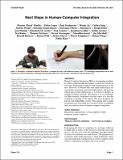Next Steps for Human-Computer Integration
Author(s)
Mueller, Florian Floyd; Lopes, Pedro; Strohmeier, Paul; Ju, Wendy; Seim, Caitlyn; Weigel, Martin; Nanayakkara, Suranga; Obrist, Marianna; Li, Zhuying; Delfa, Joseph; Nishida, Jun; Gerber, Elizabeth M; Svanaes, Dag; Grudin, Jonathan; Greuter, Stefan; Kunze, Kai; Erickson, Thomas; Greenspan, Steven; Inami, Masahiko; Marshall, Joe; Reiterer, Harald; Wolf, Katrin; Meyer, Jochen; Schiphorst, Thecla; Wang, Dakuo; Maes, Pattie; ... Show more Show less
Download3313831.3376242.pdf (1.510Mb)
Publisher Policy
Publisher Policy
Article is made available in accordance with the publisher's policy and may be subject to US copyright law. Please refer to the publisher's site for terms of use.
Terms of use
Metadata
Show full item recordAbstract
© 2020 ACM. Human-Computer Integration (HInt) is an emerging paradigm in which computational and human systems are closely interwoven. Integrating computers with the human body is not new. however, we believe that with rapid technological advancements, increasing real-world deployments, and growing ethical and societal implications, it is critical to identify an agenda for future research. We present a set of challenges for HInt research, formulated over the course of a five-day workshop consisting of 29 experts who have designed, deployed and studied HInt systems. This agenda aims to guide researchers in a structured way towards a more coordinated and conscientious future of human-computer integration.
Date issued
2020Department
Massachusetts Institute of Technology. Media LaboratoryJournal
Conference on Human Factors in Computing Systems - Proceedings
Publisher
ACM
Citation
Mueller, Florian Floyd, Lopes, Pedro, Strohmeier, Paul, Ju, Wendy, Seim, Caitlyn et al. 2020. "Next Steps for Human-Computer Integration." Conference on Human Factors in Computing Systems - Proceedings.
Version: Final published version